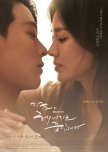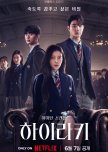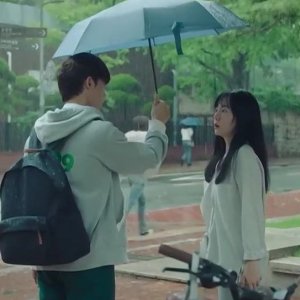
A romantic story about life beautifully told in a slow-breathed and melodic narrative.
Now, We Are Breaking Up is a melodrama with a makjang intrigue, both mature and modern, which creates an interesting contrast to the more traditional storyline. The focus on the women is really good, and the friendships along with the work scenes add dynamism to the drama.While the drama may not be conventionally entertaining, it captivates in an impressive way. Why? Because it's poetic and relatable, because of its mature and philosophical dialogue, because of its title meaning so much more, because of its cast/OST/cinematography, because of its setting, the opening, and the leads being the first to speak French so well in dramas.
It's not a drama focused on cheesy lines, butterflies, or surface-level moments. The chemistry here reflects how professional adults with such personalities genuinely connect with each other.
Even though it's slow-paced, if you want to watch something adult, melancholic and classy, you can have a great time with this drama. And some of the tracks were so good that I still listen to them, like Tangle Destiny, Tempest and 10 Years Ago.
To end on a good note, I will share my opinion on the ending in the comments. What I can say is that even though it's a melodrama, it leaves you with a warm feeling. This brings me to say that despite being a cold drama to others on the outside, NWBU gives me a warm feeling I can't find anywhere else.
Posted a scene that sums up what I love about this drama (beginning of episode 12) : https://www.reddit.com/user/_sunoh/comments/1ph4gcy/now_we_are_breaking_up_episode_12/
Was this review helpful to you?

This review may contain spoilers
Romantic thriller about privileged teenagers - an intense work beyond appearances.
My review with images, spoiler marks and favorite scenes: https://www.reddit.com/user/_sunoh/comments/1ljwqtb/hierarchy_review_an_intense_work_beyond/This drama fascinated me, unlike all the criticism. Rather than being impressed by the drama’s budget, what truly struck me in the end was the talent and golden heart of the screenwriter, along with the skill of the director and actors.
(I originally wrote this review for a French Discord, but I decided to post it here)
Hierarchy is a drama that, behind an apparent classic structure — elite school, bullying, revenge — stands out precisely through its ability to go further, delivering a human, emotional, and above all, resolved story. And that is its strength. And it's a pleasure to watch, because it's truly fresh, youthful and contemporary.
The story doesn’t need a sequel because it is complete. Kang Ha gets the truth he seeks, and justice is served. No blind revenge, no spectacular payback, but a quest for meaning, understanding, and repair. The drama doesn't dwell on the brutality of a bullying as often seen elsewhere, it chooses a more subtle, mature, realistic tone. And that makes all the difference.
Kang Ha, as a central figure, disrupts the established order through his academic excellence, courage and emotional intelligence. The way he prevents the sharing of the video, or his heartbreaking line to Ri An — “Learn to live with your guilt because I will never accept your apology” — gives the whole story its meaning: a life lesson, not a revenge tale.
Every line of dialogue matters, every word carries weight, and it’s in these exchanges that Hierarchy finds its full scope. The final episode is especially striking: intense, accomplished, and deeply moving.
Jae I herself embodies the ambivalence that makes the characters so human. Both victim and witness, stoic yet wounded, she perfectly illustrates the emotional complexity the drama aims to convey. Her performance, subtle and restrained, makes her a memorable character, just like Kang Ha, whose portrayal literally carries the drama. Moreover, all the main characters—and many others—add depth and nuance to the story.
Far from being a simple “aesthetic” drama, Hierarchy knows exactly where it’s going. It doesn’t seek consensus perfection — it seeks resonance. And it succeeds, because every episode is dense, every emotion measured, every transformation believable. Even Ri An benefits from a complex and realistic character arc. And that’s precisely what makes this work memorable: nothing is black or white, and above all, everything is said.
The settings themselves play an equally interesting role. They depict a school of unreal beauty, which makes the contrast with the darkness of the drama all the more striking. It evokes certain dystopian films: a seemingly perfect world where the worst seeps into every crack. This visual dissonance is no accident — it reinforces the drama’s atmosphere and underlines its tensions. And clearly, I’ve never seen such beautiful color grading in a show.
It's easy to criticize the drama for a lack of originality, but that's a misreading. Hierarchy doesn’t overplay elitism or corruption — it deconstructs them with finesse. And above all, it highlights a powerful message: the importance of change, awareness, and education — even in the most closed environments.
All in all, Hierarchy is a short but impactful drama. Not because of its spectacular aspect, but because of its sensitivity, accuracy, and its ability to evoke emotion without relying on gimmicks. The drama doesn't aim to shock — it aims to heal, to bring growth, and it does it well.
The post-credits scene (there is another at the end of Episode 5, though nothing important) teases a Season 2 despite the story being over, but I would gladly accept it in all honesty. At least for now, the cast got reunited in Crushology 101. (Lee Chae Min, Roh Jeong Eui and Kim Min Chul)
Was this review helpful to you?


 1
1


















